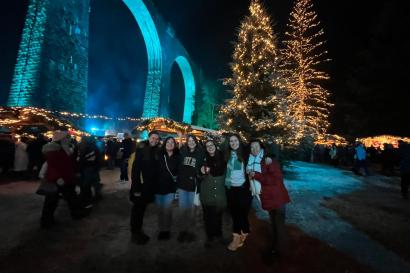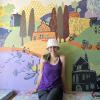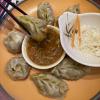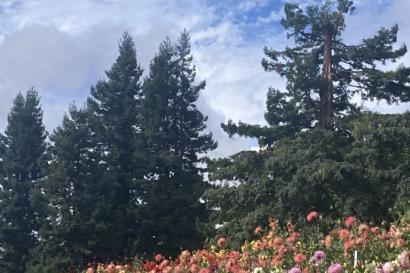
This story begins two years ago on a crisp October afternoon when, while wading through leaves in the backyard of my childhood home, I opened to the first page of Herman Hesse’s Narcissus and Goldmund. At the time, the magnitude of this simple gesture eluded my understanding, but I would soon glimpse the influence and serendipity that accompanies a piece of inspiration so exact to one’s situation that it feels like fate.
During the fall of 2020 I was in the midst of a gap semester; My primary argument for this somewhat controversial decision was that I disliked learning online, but really, I disliked learning biomedical engineering, period. My major and entire life plan, formulated from the time I was an eager, AP loving high school junior, had been dashed, not by Covid but by my own realization that what I was passionate about wasn’t what I was studying. I had had enough of what I felt was the stifling, contrived atmosphere of arbitrary deadlines and repetitive formulas that accompanies the ultra-cerebral academic realm. What I craved was entrance into that raw, passionate, imperfect stream of consciousness that I believe comprises real life. I wanted to live.
However, when you suggest to your parents and society at large that a job-secure track in the engineering field be traded for, of all things, a philosophy major, the feedback you receive is oftentimes less than encouraging. It seemed that few could acknowledge the validity of my trade of realism for risk. Luckily, my parents were included in those few, although my mother, ever the paragon of practicality, openly acknowledges her role as a “dream-squisher.” In those days my biggest critic may have been myself. Sometimes, a judgmental gaze turned inwards casts a harsher light than any that pierces you from the outside, and this particular gaze was a formidable adversary to that other voice, just breaking through to the surface, which refused to be gaslit by culturally approved messages about the “correct” map to follow when searching for a meaningful life.
As I began leafing through Narcissus and Goldmund, I discovered that the realms of duty and desire, of pragmatism and utterly impractical beauty were both worthy of lifelong pursuit, and in the novel’s main character, Goldmund, I found a companion in my present struggle to reconcile warring ideals within. You might compare this sudden breakdown of identity to a midlife crisis. Instead of buying a Ferrari, I changed my major to anthropology (not philosophy, to my mom’s relief) and planned a semester-long trip to Germany.
Despite the pivotal role that Herman Hesse and his novels played in this life transition, studying in Germany, just a few hours in both directions from the cities he called home, was a coincidence. This author’s wisdom occupies a foundational position in the heart of this country, so that whenever I pass bookstores the name “Hesse” pops out amidst the myriad of authors stacked in windows and sale bins. It reminds me daily of the struggle for identity, a struggle that we all face and one which will present itself to you when you exit the plane in whatever faraway place you choose for your time abroad.
You’ve likely heard both of these conflicting axioms—that you should let go, lose yourself in the experience of studying abroad, but that it’s also a way of finding yourself. So which is it—lose or find? If you ask me, it’s both.
When you leave behind preconceived notions and deeply rooted habits, the door to personal growth opens wide. Like Goldmund, who abandons adolescence at the monastery to pursue love, art, and pain, the steps you take to grow while abroad may not always be comfortable. Often, discomfort is the price we pay for a life that feels epic.
The art of toeing the line between lost and found finds expression when you decide whether or not to let yourself get lost, and once lost, if what you have found is something you want to keep. Here in Germany, biergartens and clubs are a staple of life for people my age. A lot of my peers participate in this lifestyle but for the most part I’ve chosen not to. My friends think it’s a bit odd (“but you’re in Germany, shouldn’t you live like the Germans? You’re only there for a short time so you have to try it!”). I know from experience that I’m just not interested, and that’s okay. Maybe you give it a go once or twice and just don’t have a good time. Then what? Do you cut your losses and spend your time in ways that you find enjoyable, or do you go again and again because it’s the thing to do, because all your friends are doing it?
It could be peer pressure influencing your actions, or maybe it’s one of a million other factors that will challenge your identity while abroad. The desire to have a presence online—would you really want to do that activity if it didn’t provide a good photo op? (I am very guilty of this one!) FOMO, or as I like to call it, experiential materialism—“I’m only here once; I have to try everything or I’ll regret it!” That one will drain your energy and your bank account very quickly. And then there’s the general aesthetic appeal—wanting to be the quintessential European café-going latte-drinking city girl. Soon you’ll find that you are walking around in the shell of a character you created, ignoring your own realities and all the amazing things that make you you.
If there were ever a mantra for keeping your balance when these factors are bearing down on you, it’s “don’t let study abroad change who you are.” That is, don’t let it change the core values that underscore your daily existence, regardless of physical location.
Ultimately, we are all on individual trajectories of becoming. I like to imagine this when I stand at the crossroads of the city center. Hundreds of people board trams, some the 1, others the 3. I see the physical direction they have chosen, but I am left to wonder which way their personal growth is headed. When only you can see your true identity, then its trajectory is up to you and fate alone. So, who do you want to become?
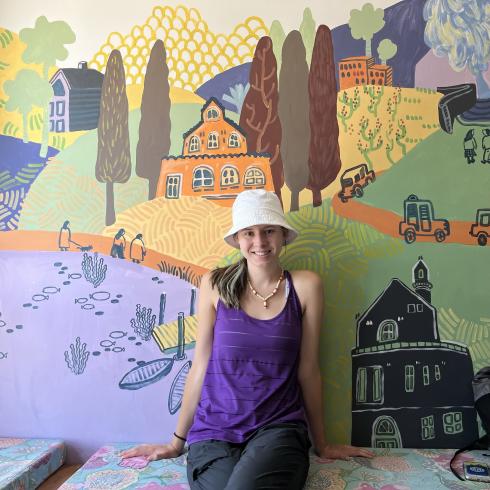
Isabel Pineo
Hi there! My name is Isabel Pineo and I am coming to you this semester from Freiburg im Breisgau, a charming city in the Black Forest of sunny southern Germany. The official reason I’m here: to learn about environmental studies in a culture and urban setting known for its emphasis on sustainability. Unofficial reason: to eat amazing food, go on lots of hikes, meet fascinating people both local and foreign, and to focus on putting my physical and mental health first. I guess you could say that I’m searching for answers to the question of what it means to live rightly in the world, for the Earth and for ourselves. Since most of us have been asking that question for a very long time, I’ll be sure to update you on all the answers I find as the semester progresses!
